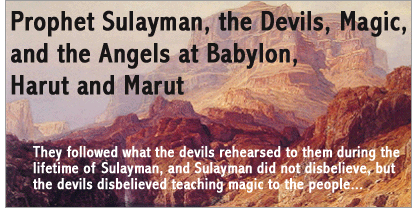
|
Shaykh Ibn al-Uthaymeen: Sikhr Takhyeeliyy (Illusionary Magic) is True and Real and Has an Actual Effect
Filed under: Magic and the Occult Monday, November 05 2012 - by Abu.Iyaad |
Mail to a Friend • Printer friendly

In this article we have two questions and answers relating to whether magic is real or not, and in the answers of Shaykh Ibn al-Uthaymeen (rahimahullaah) we have a clarification that that which is referred to as sihr takhyeeliyy is in fact actual magic which has a true and real effect, as in upon the person afflicted with it. These answers should help the misunderstanding about what this title "sihr takhyeeliyy" actually means. The reason why it is referred to as such is explained below in the answers of the Shaykh, particularly the second one.
The First Question
Here we have Listen to audio file.
Questioner:
The Mu'tazilah (in their claim that) sihr (magic) has no reality to it use as evidence the Exalted's saying, "Then behold, their ropes and their sticks, by their magic, appeared to him as though they moved fast." (20:66), so what is the reply to this ...
Shaykh Ibn al-Uthaymeen:
[words not entirely clear] reality or not a reality, when a person is made to perceive that an inanimate (stationary) rope is moving yet (in reality) it is not moving, has (magic) affected him or not? [Questioner says "Yes"]. Magic makes a person's thought (fikr) to become flawed, he see the inanimate, ropes and sticks, they do not move, but they make them appear to move, they do not move, however it was made to appear as such to him. So has this (magic) affected or not affected (him)? (Of course), it has had an effect. The evidence they use is against them...... We say magic has an effect upon a person, it makes him ill, affects his thought, perhaps it might make him mad, or he might die...
The Second Question
This can be found in the Shaykhs' fatawaa on aqidah and can be seen in this article, question no. 41:
Question:
فضيلة الشيخ ، هل السحر حقيقة أم أنه تخيل أو تخيلات على الناس؟
Esteemed Shaykh is magic true and real or is just imagined, or imaginations given to people?
Shaykh Ibn al-Uthaymeen:
السحر حقيقة ولا شك، وهو مؤثر حقيقة. لكن كونه يقلب الشيء أو يحرك الساكن، أو يسكن المتحرك، هذا خيال وليس حقيقة. وانظر إلى قول الله تبارك وتعالى في قصة السحرة في آل فرعون ، يقول الله عز وجل: (سَحَرُوا أَعْيُنَ النَّاسِ وَاسْتَرْهَبُوهُمْ وَجَاءُوا بِسِحْرٍ عَظِيمٍ) كيف سحروا أعين الناس ؟ سحروا أعين الناس حتى صار الناس ينظرون إلى هذه الحبال والعصي كأنها ثعابين تمشي، كما قال الله تعالى في سورة طه: (يُخَيَّلُ إِلَيْهِ مِنْ سِحْرِهِمْ أَنَّهَا تَسْعَى)، فالسحر باعتبار تأثيره في قلب الأشياء ، وتحريك الساكن ، أو تسكين متحرك ، هذا ليس له أثر ، لكن في كونه يسحر أو يؤثر على المسحور ، حتى يرى الساكن متحركاً والمتحرك ساكناً ، هذا أثره ظاهر جداً ، إذا فله حقيقة ، ولهذا يؤثر على بدن المسحور وعقله وحواسه ، وربما يهلكه
Magic is a reality no doubt, and it affects in reality, however that it turns something (into something else) or makes that which is stationary to move, or that which is in motion to become stationary, all of this is imaginary and is not real. Look at the saying of Allaah, the Blessed and Exalted in the story of the magicians of Aal Fir'awn (the family of the Pharoah), Allaah the Mighty and Majestic says, "They bewitched the eyes of the people, and struck terror into them, and they displayed a great magic" (7:116). How they did bewitch the eyes of the people? They bewitches the eyes of the people such that the people were looking at these ropes and sticks as if they were moving snakes, as Allaah the Exalted said in Surah Taha, "By their magic, appeared to him as though they moved fast" (20:66). So in terms of having an effect in changing actual things, or making what is stationary to move and what is moving to become stationary, magic has no effect (at all). However, in bewitching or affecting the one upon whom magic has been done, such that he sees what is stationary to be in motion and what is in motion to be stationary, then this has a very apparent effect, hence, it does have a reality, and for this reason, it affects the body of the one upon whom magic has been done, and his intellect (mind) and his senses, and perhaps it may destroy him.
From the above it becomes very clear that whilst this type of magic has no effect on actual entities (external to the one on whom magic has been done) - it does have a tangible, true, real effect on the faculties of the one upon whom magic has been done. And these two meanings are combined in the phrase "sihr takhyeeliyy."
Useful Classification of Magic That Removes Confusion and Ambiguity
What has preceded is a nice explanation and clarification from the Shaykh and from this discussion and the many other articles we have from many other Scholars, we should understand that magic (sihr) can be divided into three broad types:
Sihr Haqeeqiyy: True, effective magic, as in that which physically affects a person whose effect is real and true and perceivable and felt and this is when a person becomes ill or dies, or goes mad, or when two spouses are separated from each other by it, and so this affects the bodies and the hearts and the mindsSihr Takhyeeliyy: Illusionary magic, with the meaning that a person's perceptive and imaginitive faculties have magic done upon them such that a person sees and perceives with the eyes that which is not so in actual reality, and this is when a person sees a child as a puppy, or a spouse as an animal or ropes and sticks as moving snakes and the likes. And one should not be confused by the fact that this type is called sihr takhyeeliyy (magic which is illusionary), it is only called this because it relates to affecting the perceptive faculties of a person, without it actually changing external reality, because a magician cannot turn a child into a puppy or change the essences of things. But this magic, if we put its ambiguous title to one side, is also true and real magic in the sense that it does have a true and real effect, which in this case is upon the perceptive faculties of people. See further illustration of this by Shaykh Muhammmad bin Haadee (in this article). This type of magic is also referred to as al-taqmeer - which is a type of magic which lasts only a very short time, a couple of minutes, or mere moments - in which a person's perceptive faculties are affected temporarily and this is often used by thieves to steal and it is also used by magicians to deceive the people into seeing what is not actually there for a short time. This (al-taqmeer) is also the type of magic used by magicians (in Saudi Arabia) to snatch children from their parents in public places - something that has received media attention recently.
Both the above two types enter into the legislative meaning of sihr (magic) and both involve the agency of the devils and they are from the legislative meaning of sihr (magic) and collectively, these two types of magic affect a) the bodies b) the hearts, c) the minds, d) the perceptive faculties (like the eyes) and magicians use a variety of ways and means to effect this type of magic. In order make this magic work they have won the service of the devils.
Sihr Majaazee: Figurative magic, meaning, magic only with the linguistic meaning of the word, which means that which takes place by hidden, imperceivable ways, and this includes that mentioned by the Shaykh regarding those who use potions and the likes in order to cure people as they claim, and also the sleight of hand magic that involves deception using skills a magician has developed, monopolizing on specialized knowledge of materials, chemicals, technology and the likes which are used to perform tricks - all of which can be given proper explanations provided one has the relevant knowledge and the type of tricks being used. This is called "sihr" from its linguistic meaning - and this is also unlawful, though it does not expel from Islaam. However, this type is often used as a stepping stone to that which is from the first two types, and many of those who practice this type of magic, it is often the case that some of what they do involves the assistance of the devils. For this reason, all forms and types of magic are prohibited in Islaam.
Link to this article: Show: HTML Link • Full Link • Short Link
Related Articles:
Add a Comment (comments are currently moderated)
You must be registered and logged in to comment.
| Search This Site |
| Tags | |
The Dajjaal (Anti-Christ) is the One-Eyed Liar
Sorcerers, Magicians are the Worshipers of the Devils

